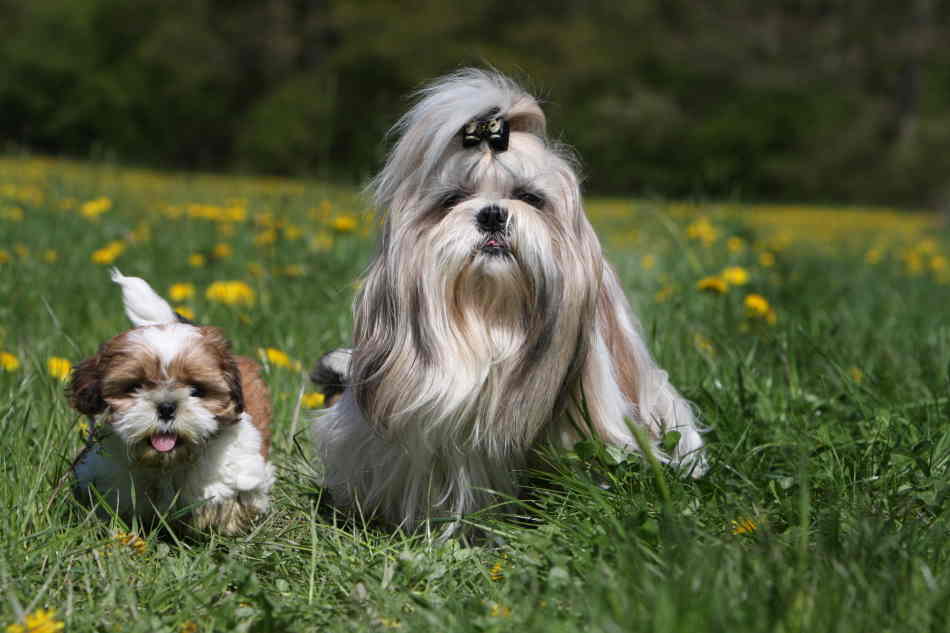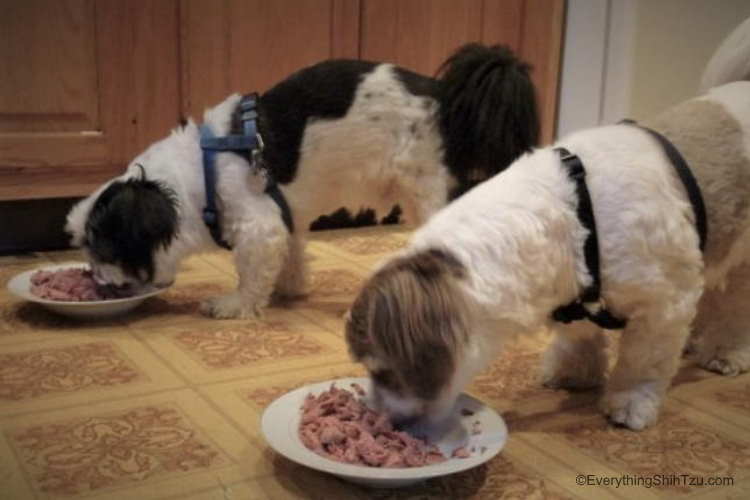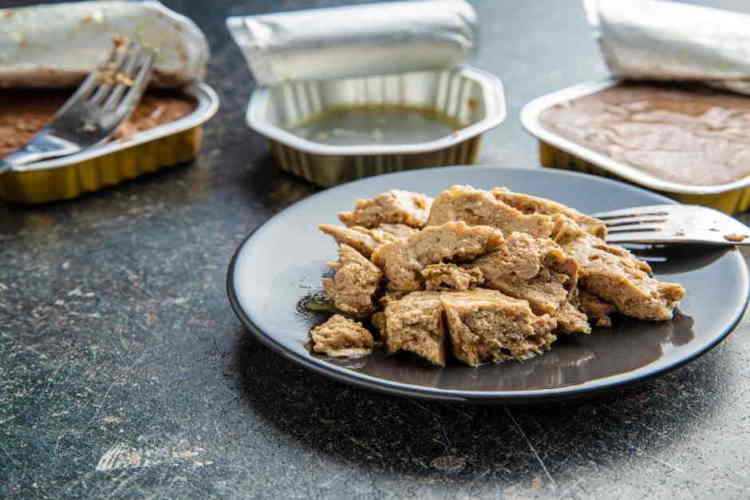- Home
- Shih Tzu diet
- puppy vs adult dog food
Puppy Food vs. Adult Food: Should Puppies Eat Adult Dog Food and Vice Versa
By Everything Shih Tzu October 4, 2022
This post may contain affiliate links. Read privacy & disclosure policy for info
Puppy food? Adult food? What's the difference, and why does it matter what food a dog eats?
It's all the same, right?
Nope! It's not, and there are very valid reasons for the difference between the two.

Puppies and adult dogs have different needs based on their life stages.
This means that what an adult dog needs and puppies need are two different things, and therefore they should not eat each other's food.
Read on to learn more about the differences between puppy vs. adult dog food, and how each one can meet your pup’s unique needs.
What's the Difference Between Puppy Food and Adult Dog Food?
The term "puppy food" is used to describe dog food that is specially formulated to meet the dietary needs of puppies. The term "adult food" is used to describe dog food specially formulated for dogs older than 6 months.
The Association of American Feed Control Officials (AAFCO) has specific guidelines when it comes to puppy food and dog food. These guidelines are dependent on a dog's life stage.
Life stages are pretty simple. They are what stage of life your dog is in and often refer to their developmental stages.
Dogs typically have six life stages.
- Puppy
- Young Adult (or junior)
- Adult
- Mature
- Senior
- Geriatric
During the puppy stage, puppies are weaned off milk, introduced to dry food, and fed more than in later stages of life.
The Association of American Feed Control Officials considers two different life stages when it comes to dog food:
- Growth and reproduction and,
- Adult maintenance
Some dog foods may market themselves as suitable for "all life stages"; however, this is not something the AAFCO recognizes as part of their qualifications.
More recently, there have been more specific designations when it comes to larger breed puppies as well under the AAFCO.
Puppy and adult dog food is formulated based on their different needs, and there are some key reasons for their differences.
Puppy Food Has More Calories
We all know that puppies can be rambunctious and full of energy. Their bodies are busy growing and becoming strong.
Because of this, they need more calories because they burn more!
Puppy food is more calorie-dense, meaning its ingredients have a higher calorie count to meet the puppy's needs.
Puppies need four key ingredients to have an optimal nutritional diet. These ingredients are:
- Protein
- Fat
- Calcium
- Digestible Carbohydrates
Depending on the breed and size of the puppy, the amounts of these nutrients that are needed may vary.
However, puppies need more of these nutrients than adult dogs do.
Large Breed Puppies Keep Special Considerations for Their Diet
Large breed puppies have a higher risk of developing certain diseases like developmental orthopedic diseases like dysplasia of the hip and elbows.
Large breed puppies are also more sensitive, and calcium and often need reduced fat intakes to prevent developing orthopedic diseases.
This is why larger breed puppy food formulas have restricted amounts of fats and other nutrients in their food to ensure that these pups are growing at a healthy rate.
Senior Dogs Have Specific Dietary Needs
Just like puppies, older dogs have different dietary needs as well.
Dog food that is formulated for senior dogs has less protein and carbs and is less calorie dense.
In addition, senior dogs are more susceptible to diseases than younger dogs, like arthritis, dental disease, dementia, and kidney disease.
Having a balanced diet formulated for these needs can help owners manage their senior dog's symptoms.
Why Do Puppies Need a Different Diet Than Adult Dogs?
There are a couple of reasons why puppies need a different diet than adults, and one major reason is calories.
Because puppies are continuously growing, they need more calories than adult dogs do. As a result, puppies have higher energy levels and metabolism, which means they burn that energy very quickly.
This can put puppies at risk of developing nutritional deficiencies if they eat foods that are meant for adult dogs.
This is because puppy food has higher concentrations of nutrients than adult dog food does, so if they're eating adult food, this deprives them of essential nutrients.
On the other hand, adult dogs also run the risk of becoming overweight if they eat food that has higher amounts of nutrients than needed for their age.
However, if you have a dog who is pregnant or nursing, they need higher nutrients like puppies do but may not necessarily be able to eat puppy food.
When to Switch Puppies to Adult Dog Food
So, when can you switch puppies from puppy food to adult dog food?
The answer is that it depends.
Puppies are considered to be mature when they are about one year old.
However, this doesn't mean they stop growing as dogs can continue to grow until they are about two years old.
Smaller breeds, like the Shih Tzu, typically finish growing faster than large dogs do and stop growing when they are around six to eight months old.
Larger breeds can keep growing until they reach about twelve to eighteen months, or some very large breeds grow until they are twenty-four months.
If you are feeding your puppy an "all life stages" type of puppy food, you may take them off later than one that is meant specifically for puppies.
If you are feeding dog food that is specifically for puppies, then it is recommended you switch their food to adult dog food when they are around eleven to fourteen months old.
Be mindful to take breed consideration when switching.
If your dog is a mixed breed or you are unsure what size they'll be, your veterinarian is your best bet to find out when they need to transition off puppy food.
When switching your dog off of puppy food, there are things that you must do to ensure a healthy transition.
One of the most important things about switching puppies to adult food is that it has to be done gradually.
Switching abruptly can mess with their digestive system and upset their tummies.
It typically takes seven to ten days to transition your dog's foods.
This is done by slowly removing some of the puppy food and replacing it with adult food.
Every day you add less puppy food and more adult food until you fully transition the old out with the new.
During this time, you will also start to decrease the number of times your dog is fed in a day.
For example, if you were free-feeding or feeding three or so times a day, you would now lower it to two times a day.
In Summary
Puppy food and adult dog food are different for a reason.
Each type of food serves a purpose for your dog based on their life stage.
For example, puppies need more calories to help with their growing, playful, and energetic bodies, while adult dogs need fewer calories to maintain a healthy weight.
Large breed puppies also have different dietary needs due to their size and susceptibility to certain diseases, and their sensitivities to certain nutrients like calcium.
Unless a certain dog food is formulated for "all life stages," puppies should never consume foods that are meant for adult dogs.
This can cause them to develop deficiencies that can disrupt their growth and cause health problems.
When it's time to switch your puppy to adult food, you will need to transition them slowly and decrease the number of times you feed them per day.
While knowing your puppy's nutritional needs may seem like a lot, in the long run, it will help your puppy maintain the healthy lifestyle they need to transition into the healthy adult they are to become.
- Home
- Shih Tzu diet
- puppy vs adult dog food



